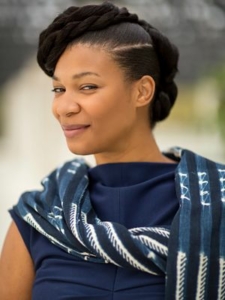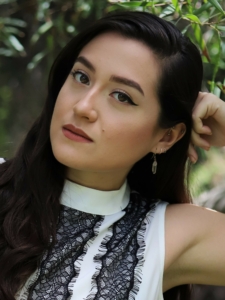Litdish: Ashaki Jackson, Poet
 Ashaki M. Jackson, Ph.D., is a social psychologist, program evaluator and poet. Her work has appeared in CURA: A Literary Magazine of Art and Action, Pluck! Journal of Affrilachian Arts and Culture, and Prairie Schooner among other journals and anthologies. Her chapbook, Surveillance, was published by Writ Large Press in March of 2016, and Language Lesson was published by MIEL in August of 2016. Jackson is also co-founder of Women Who Submit. She earned her MFA (poetry) from Antioch University Los Angeles. She can be found on her website at www.ashakijackson.com
Ashaki M. Jackson, Ph.D., is a social psychologist, program evaluator and poet. Her work has appeared in CURA: A Literary Magazine of Art and Action, Pluck! Journal of Affrilachian Arts and Culture, and Prairie Schooner among other journals and anthologies. Her chapbook, Surveillance, was published by Writ Large Press in March of 2016, and Language Lesson was published by MIEL in August of 2016. Jackson is also co-founder of Women Who Submit. She earned her MFA (poetry) from Antioch University Los Angeles. She can be found on her website at www.ashakijackson.com
1. Did you always write poetry? Or did you start out with a different medium of writing?
Poetry came first. I started my journey with rhyming poems during middle school. By high school, I was translating Shakespeare into contemporary language. I didn’t return to poetry formally until graduate school, having made biological sciences my undergraduate study focus. These days, academic writing and poetry compete for equal time.
2. How was your writing ritual changed since you first began poetry?
“Ritual” is what I can scrape together in the time the week hasn’t taken from me. I once had a routine for my dissertation: three days weekly I grabbed a seat at a coffee shop just before the morning rush and wrote pages until I became hungry for lunch. I generated chapters this way. Of course, graduate study often comes with time and funding to support that Coffee Lifestyle. In the three hours that I now have on weekends, I take paper and a Blackwing pencil to a coffee shop and write every phrase and stanza that I can scavenge. Sometimes, I read for research. Sometimes, I submit.
3. What snacks or other vices do you enjoy while writing?
Matcha latte with oat milk. Hands down.
4. What’s the most recent thing you’ve written?
My current project is very green, but here is my best take: I’m writing about a recent death in the Pacific Northwest and the ways the incident is in conversation with police brutality, specifically the mothers who participate in press conferences—a very public grieving forum.
5. What piece of advice on writing would you give a younger version of yourself?
All writing is new and deserves time to rest. Nothing is final. It’s OK to return to what you’ve written later to revise, retool, and rebuild several times before feeling settled. Do not feel pressured to submit fresh work for publication that hasn’t been given its full opportunity to become complete.
6. In Language Lesson, you discuss loss and death in a different aspect than your first book. What do you hope readers will take from this collection that might echo some similar emotions in Surveillance?
Language Lesson was selected for publication first yet received a later publication date than Surveillance. I began writing the poems in Language Lesson following the 2008 death of my paternal grandmother, which was a paralyzing loss. I chewed on those pieces for years until I finally felt at peace with the work—until I had described my full-throated grief and gave readers permission to also grieve in their ways. It isn’t a long chapter-book, but it is an emotionally laborious one. Surveillance, which received a publication offer after Language Lesson, but was printed prior, can land on readers as angry and punitive. I hope that it does. The loss of life can be devastating. When life is taken, rage sets in. There is sadness in both collections: one allows grief and the other demands action based on that grief.
7. Who are some emerging poets you’ve been watching? Who should we be reading?
Please, look up the historical, political memoir poems on escaping a violent dictatorship in the Philippines by Soleil David. The poems are energetic, and they claw. Also, look for the tender work on departure and mothering by Elisabeth Adwin Edwards. Her chapbook, The Way I Learn to Take It Like a Girl, is pulsing with honesty and catharsis.
8. Have you ever experienced doubt about the writer’s lifestyle? How do you cope with personal shortcomings that feel like failure?
This isn’t a direct answer to the question, I know, and it probably isn’t satisfying for persons looking for quick answers. There is no lifestyle; there are rules that you set for yourself. Be reasonable with those expectations and know who is setting them. Keep reviewing those expectations, especially the ones you’ve set for yourself, to make sure they are realistic and not harmful.
9. What is your favorite or go-to musical artist?
For meditation: Radiohead, Flying Lotus
For Black joy: Kendrick Lamar, Anita Baker, Cardi B
For road trips: Hall & Oates, The Police, Toto
Amanda Lopez is a poet studying for her MFA at Antioch University Los Angeles (AULA), where she serves as Editor-in-Chief for the student-run literary magazine Lunch Ticket. She has served as a management assistant for Write Bloody Publishing and read on the literary journal The Redlands Review as Poetry Editor during her undergraduate years at the University of Redlands. Amanda is a Los Angeles native working on a collection of poetry about navigating relationships through mental illness. When Amanda is not writing, she finds passion in alternative and rock music and being a makeup and special effects artist.





